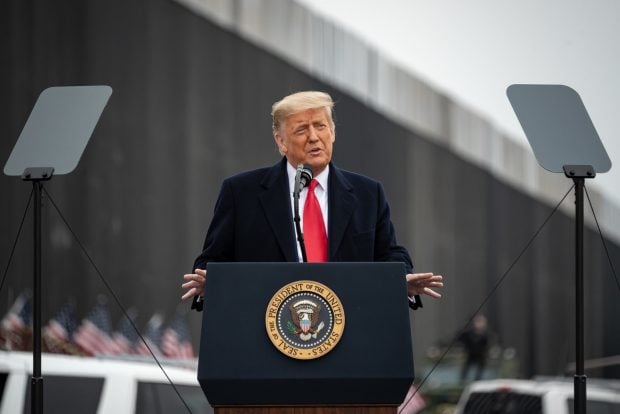Republicans could politicise 50,000 civil service jobs, US academic warns

A Republican president would revive Trump’s bid to take powers to dismiss any civil servant involved in policy work, a leading American academic has said at an event on civil service impartiality. Former Australian civil service chief Peter Woolcott suggested a different way forward
“The Trump administration felt that they didn’t go far enough,” said Donald Moynihan. “They didn’t take control of the ‘deep state’ and aggressively purge it of the disloyal.” If a Republican wins the 2024 US presidential election, he warned, public servants will face “the most dramatic change in the civil service system since its creation.”
Professor Moynihan, McCourt Chair of the McCourt School of Public Policy at Washington DC’s Georgetown University, was setting out Republicans’ ambitions to resurrect ‘Schedule F’: a 2020 Trump executive order rescinded by Joe Biden in his first days in office.
Speaking at an Institute for Government (IfG) event on global approaches to civil service impartiality – a follow-up to a previous, UK-focused event, at which former UK Cabinet Secretary Lord O’Donnell spoke out against increased ministerial control on civil service appointments – Moynihan explained that Schedule F would give the president “the right to convert career employees with a policy advisory role into political appointees – so if the president fires them, they have no right to contest that firing”. The reform would increase the number of appointees in the US system from around 4,000 to “something like 50,000,” he added.
Schedule F would “certainly come back under a Republican president, even if that president is not Trump,” said Moynihan. Republican candidates including Ron DeSantis have backed the change, and “conservative think tanks like the Heritage Foundation have embedded this in their transition guidelines for whoever the next Republican president is.” The policy represents “a very large unexploded mine sitting in the field of good governance in America, where it’s going to matter not just to the quality of policy advice or implementation, but also to the security of democracy,” he said, warning of the dangers of a “president who can reach in so deeply into the career civil service, and toss out people who are not going to be acquiescent to his wishes.”
Read more: Trump aides plan federal staff purge in event of 2024 re-election
The ‘enemy within’ theory
The idea of expanding political appointments is borne of a Republican belief that “runaway bureaucrats are openly resisting the political appointees” put into leadership roles, said Moynihan; but in his view, Schedule F would only exacerbate existing weaknesses in the American model. The president’s power to directly appoint leaders across government is designed to introduce “agents of change and innovation”, he explained; but appointees often lack any experience of working inside government, or a detailed understanding of relevant legal and regulatory issues.
“It can be frustrating if you’re an appointee coming in and want to change things quickly, and a lot of what you hear from career staff is: ‘You can’t do that,’ even if that is grounded in reality,” Moynihan commented. “This is compounded by the fact that the typical tenure of political appointees in the US is 18-24 months, so they’re often not there long enough to build up enough knowledge to manage well. And at the back of their minds they’re consistently thinking: ‘I need to get two or three big, visible things done in my 18-24 months, so I want to move quickly’ – but they’re not necessarily thinking about the long-term health of the organisation.”
Career officials’ objections to appointees’ ideas, Moynihan said, are often well-founded. President Trump’s first impeachment, he noted, followed clashes between appointees and career staff over the legality of arms exports to Ukraine: “the president would have been saved an impeachment if he and his appointees were a little bit more willing to listen to career officials when they raised red flags about what was going on, instead of insisting that they knew better.” Nonetheless, said Moynihan, Republican-appointed officials have often concluded that the objections of permanent staff are driven by personal or political motives; Schedule F represents an attempt to ensure that all those involved in delivering a Republican president’s agenda are fully committed to the project.
A further politicisation of appointments would, however, only exacerbate the problems caused by a lack of expertise and experience among appointees. It could also lead to further delays in the process of filling posts after a presidential election: Congress currently approves 1,300 appointees, Moynihan noted, in a process whose average length has increased from 56 days under Ronald Reagan to 124 under Joe Biden. These growing timelines have meant that “we often have too many empty seats where political appointees should be sitting,” he commented, “and that leads to a vacuum when it comes to leadership.”
Read more: New salvos fired in the wars of Whitehall
A different way forward
Nonetheless, some UK politicians are also pushing for more political control over civil service appointments – with Lord Maude’s forthcoming review of civil service governance and accountability, commissioned by the government last year, set to recommend giving ministers a greater say. Brexiteers in particular regularly claim that civil servants are blocking their policies, noted IfG programme director Catherine Haddon, “and because the civil service aren’t able to answer for themselves… that perception still pervades for some of the Conservative Party; for some people who’ve been ministers.”
One potential solution lies in the Australian model, said Peter Woolcott AO, the former Australian Public Service Commissioner. Under the Members of Parliament (Staff) – or ‘MOPS’ – Act, the prime minister can appoint more than 400 staff within ministerial offices; the leader of the opposition can also select about a third of that number.
“Public servants should never be part of the political process,” said Woolcott, arguing that appointed ministerial staff “can provide that political overlay”. That helps keep the public servants out of overtly political activities, such as deciding “how you handle media, how you handle stakeholders.” In his view, the MOPS system is “fundamental to keeping the public service in Australia impartial.”
The system is currently being upgraded, he added, with a new National Anti-Corruption Commission able to investigate improper behaviour by ministerial staff. These appointees have never been directly accountable to parliament, noted Woolcott; but this commission will “for the first time, be able to scrutinise them to the same extent that it can scrutinise the behaviour of public servants.”
Politicise ministerial advisers, not policy officials
The UK still lacks direct ways to hold its own equivalent of ministerial staff – known as special advisers, or ‘spads’ – to account in parliament. But Haddon argued that Britain could benefit from following the Australian lead, expanding the number of political appointees working in ministerial offices. Ministers are overloaded, she said, and civil servants aren’t able to “do that political overlay; special advisers are able to support ministers in that.”
“I think we can look abroad and say that, actually, using the UK approach, it is possible to expand [the number of spads] and help deal with the overload problem that we’ve got in government,” said Haddon. This approach would avoid politicising the civil service, while providing ministers with more support and capacity to pursue their goals. “It’s not a bad way to work,” commented Woolcott. “I think it’s been fundamentally important to keeping Australian public servants impartial, because someone else is providing that political overlay.”
Over in the US, Moynihan plainly preferred this approach to the Republicans’. Academic studies have found that “political appointees are associated with lower performance of federal programmes. And as parts of government become perceived as more politicised by career employees, those career employees are more likely to indicate that they’re planning to leave the organisation, and less likely to invest in long-term development in their own expertise,” he concluded. “Our model of politicisation of the public service has not generated benefits and accountability that justify the negative costs, in terms of absence of leadership and conflict within the administration, and decline in performance.”























